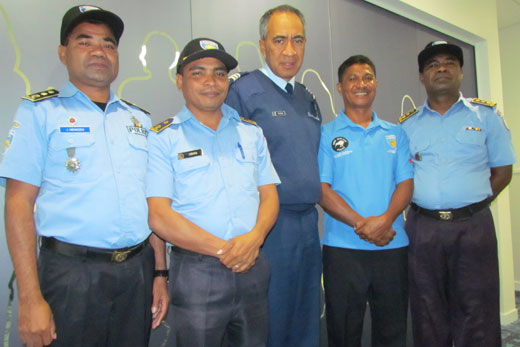Watching Bay of Plenty police officers welcomed at schools with hugs from children is like gazing into a crystal ball of the future for three visiting Timor Leste District Commanders.
The trio of top Timor Leste policeman are visited the BOP region this week to learn from NZ Police community policing programmes, which they hope to utilise back home.
Timor Leste police Viqueque district commander Justinho Menezes, Bobonaro assistant superintendent Amaral Inacio, with Tauranga Police Seargent Nga Utanga, NZ Police senior programme officer Armando dos Santos and Anaro district commander Orlando Gomes.
'One of the different things we see while here when we visit schools is there's a very solid relationship between students, children and the police,” says Anaro district commander Orlando Gomes, who has 105 staff and oversees four sub-districts.
'That is a wonderful, big difference to us,” says Anaro, who is accompanied Viqueque district commander Justinho Menezes, who has 140 staff and controls five sub-districts with a population of 85,000 and Bobonaro assistant superintendent Amaral Inacio, who has 125 staff and looks after six sub-districts and 97,000 people.
'When NZ Police visit the schools, kids are coming up hugging the police, this is something much different to ours.”
NZ Police senior programme officer Armando dos Santos, who is based in Timor Leste, is accompanying the men on the Ministry of Foreign Affairs funded trip.
Part of a joint government agreement, the visit allows Polisia Nasional De Timor-Leste and NZ Police to work collaboratively in building capacity within Timor's police force.
Tauranga Police Seargent Nga Utanga says the four men are part of a group of 14 Timor Leste police scattered around NZ Police bases for the trip, which began June 30.
The four men spent a week in the BOP looking at the police's community policing programmes, including Taupo Police's Combined Adolescent Challenge Training Unit and Support, and undertaking police school visits.
'Timor Leste has 13 police districts and 75 per cent of the country's population is under age 30,” says Nga, who last year spent three weeks in Timor Leste creating a report for dealing with young people.
Nga says the men are focusing on community policing in NZ, with Timor Leste Timor police facing more challenges than their Kiwi counterparts, as they don't have the technology or resources available here.
'Timor Leste is only a very young country, its only 12 years old; so that's how old the police are.
'So they've come to NZ to have a look at what their future may look like because of the similarities, especially with the Maori community and Timorese people,” says Nga.
'Culturally, they're structured the same as us – Maori have iwi, hapu, whanau, and they have whanau and suka.”
Nga says a marae visit to welcome the men last Thursday hit home in terms of getting closer to their people.
'Trust and confidence is what they're learning a lot about – only because of the history of violence in Timor.
'What they're saying is they're going to go forward in peace to create a better future for their country.”
'It's not that they're going to take the programmes back to Timor, it's about them seeing how police interact with young people in the community,” says Nga.
'They're Timor Police's decision-makers, and they want to try and plot a better future for this very young country.”
Justinho says the school visits have been very beneficial.
'Seeing what happens when police visit the schools has been very good. It's something we'll take back to Timor, says Justinho, who says the three pillars of policing in New Zealand –Visibility and Involvement in community and Professionalism of police – are very important.
'We've also these pillars implemented in Timor Leste but we've learned a few different things for us that we haven't applied yet, but will be beneficial to the Timorese people.”
'So were going to use them as a reference when we go home.”
The trio say a challenge to policing in Timor Leste is lack of human resources, in terms of capability and staff numbers.
'Another challenge we face is working facilities; we don't have enough technology and facilities to support us in our community policing work,” says Justinho.
'Information electronic database systems, such as email and wifi, are pretty poor.”
The trio want to thank NZ Police and MFAT for the trip, saying one interesting thing they've learned is how Kiwi district commanders visit all police staff monthly.
'This is a wonderful, new thing to us. The visibility of a commander within his own troops is important.”



0 comments
Leave a Comment
You must be logged in to make a comment.